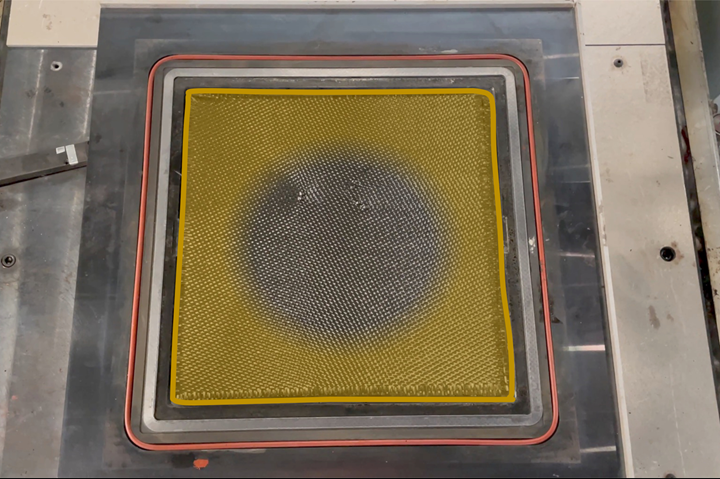Nexam Chemical, the NCC develop solution for manufacturing high-temperature composites
Nexam Chemical’s Neximid high-temperature resin system can operate at temperatures up to 400°C, expanding the boundaries of composites into more demanding applications that weren’t previously possible.

Photo Credit: The NCC, Nexam Chemical
The National Composites Centre (NCC, Bristol, U.K.), in a collaboration with Nexam Chemical AB (Lomma, Sweden), has successfully manufactured a composite using a high-temperature resin, providing a solution to the challenge of using advanced materials in components that need to withstand extreme temperatures.
The NCC’s interdisciplinary expertise in the fields of high-volume manufacturing, tooling, design, materials science and flow simulation are said to have aided in solving the manufacturing challenges existing at elevated temperatures and proven a composite part can be made using resin. This development paves the way for industry to take advantage of the qualities composites offer, the NCC says, in elements that get very hot, such as sections of engines and the housing for electric batteries, which wasn’t previously possible.
Throughout their research, the specialist team used Nexam Chemical’s new resin system, Neximid. Produced in the U.K., Neximid can operate at temperatures up to 400°C, higher than almost all other resin systems the NCC reports. While resin transfer molding (RTM) is usually conducted at around 120°C, by developing high-temperature specialist equipment — including unique tooling design and high-temperature sealings — the NCC were able to keep the resin above 250°C throughout the injection process, allowing the resin’s high-temperature capability to be combined with a high processing temperature for a final product that can cope with much higher temperatures than previous composites.
Throughout the process, the NCC, part of the High Value Manufacturing Catapult, has also shown that the resin system is safe, without emitting the high levels of toxic gases that other polyimide resins can.
“Being able manufacture carbon fiber composites using a U.K.-produced high-temperature resin system is a huge step forward in enabling industry to adopt advanced materials in components that were previously unable to take advantage of them,” says Dr David King, advanced research engineer at the NCC. “The excellent thermal capability of the material expands the boundaries of composites into more demanding applications. Based on the emerging details of this expanded capability we are already working with industry customers on new applications for composite parts, and are excited to further develop our high-temperature RTM capability by collaborating closely with Nexam and other partners.”
According to Boyd Cushing, business development for Nexam Chemical UK & Ireland, the company is looking forward to welcoming industrial partners who may have interest with its Scottish-origin Neximid non-ITAR restricted resin in aerospace and defense applications that are looking for high-performance material composite parts.
Following this successful collaboration, Nexam Chemical have joined the NCC as an SME Affiliate Member, paving the way for further projects that will aid industry in using high-temperature RTM to their advantage.
Related Content
-
Raw materials distributor provides quality fiberglass, resin variety
CAMX 2024: Imate Composites presents a variety of resins, fiberglass and roving products, as well as mats and catalysts.
-
Plant tour: Daher Shap’in TechCenter and composites production plant, Saint-Aignan-de-Grandlieu, France
Co-located R&D and production advance OOA thermosets, thermoplastics, welding, recycling and digital technologies for faster processing and certification of lighter, more sustainable composites.
-
New polymer expands composites options in demanding environments
Aromatic thermosetting copolyester offers unique properties, availability in multiple form factors.
















